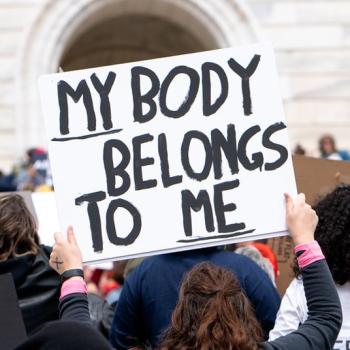Patheos’s new project, Sacred Spaces: The 100 Most Holy Places on Earth has me thinking about the concept of “sacred space.” Growing up, it wasn’t uncommon to hear of people taking huge trips to different sites, each with the hope that their pilgrimage would render a special blessing. One woman claimed she was healed at Medugorje, Yugoslavia (a place where a group of children claimed to have an apparition of Mary, mother of Jesus). A few people made trips to India, believing it was a spiritually sacred nation. Some visited new age centers that mixed Native American spirituality with Hinduism and Christianity. It seemed like everyone was looking for the sacred, looking to touch its concept in their ordinary lives.
I think what stands out to me – to this day – is that those who went looking for the sacred came back surprisingly much the same as they were when they left. Maybe my expectations were too high, but I would think if you’re spending a lot of money to go to a place you feel is sacred, it ought to do something for you. Those who had pain in their bodies might have felt better for a little while, but most had their pains return. Those who were generally angry and out of sorts remained as such. Whatever excitement their adventures brought to their lives waned. Life, such as it was, went on for them in ways that were much like they were prior.
What makes something sacred? How do we find it, and what does God tell us about the idea of sacred space? Most importantly, why does it matter?

Sacred space and holiness
“Sacred” comes from a Latin word meaning “holy.” The word “holy” means “set apart.” Thus, a sacred space is one is set apart for something, usually a spiritual purpose. We understand the basic concept: churches are “set apart,” used only for religious purposes. We don’t go to a church and expect to find a baseball game in place of a Sunday morning service. It would be inappropriate to find a striptease front and center. We understand this concept in terms of social mores, but what we acknowledge is the purpose of church is spiritual. Conversations I’ve had the past few years confirms this: the more people go to church and find secular trends (style, appearance, politics, etc.), they feel out of place. Finding things part of general society at church is a disappointment. We go to church to find something set apart for God’s purpose, something different from everything else.
The idea of holiness isn’t new. In 1 Peter 2:9 tells us:
But you are a chosen people, a royal priesthood, a holy nation, God’s special possession, that you may declare the praises of Him Who called you out of darkness into his wonderful light. (1 Peter 2:9, NIV)
Those who become part of God’s people are holy, as He is holy. We are holy! We are set apart! But what does this mean for us, today?
Worship in spirit and in truth
When I became a Pentecostal Christian, I was introduced to a new concept: the idea that we, as the people of God, are sacred. It wasn’t about buildings or special locations. Sure, special places can be significant to us, but they aren’t required for a holy experience. While people seek high and low for something outside of them, Jesus taught us a different way.
“Yet a time is coming and has now come when the true worshipers will worship the Father in the Spirit and in truth, for they are the kind of worshipers the Father seeks. God is spirit, and His worshipers must worship in the Spirit and in truth.” (John 4:23-24, NIV)
Once, on being asked by the Pharisees when the kingdom of God would come, Jesus replied, “The coming of the kingdom of God is not something that can be observed, nor will people say, ‘Here it is,’ or ‘There it is,’ because the kingdom of God is in your midst.” (Luke 17:20-21, NIV)
I love these passages for one reason: the Bible itself confirms the fact that we are God’s sacred space. God lives and works within and through us. We are here for a purpose: to love and serve God first, and serve humanity as an extension of our love for Him. While some spend their lives looking for something outside of them, God lets us know He can work within us, right where we are. Any time we worship God, our space becomes sacred, as we are sacred in Him.
Creating safe space
If the Kingdom of God is within us, it must also be among and around us. Something as amazing as the Kingdom of God can’t stay hidden! The Greek word for “within” confirms this fact: it starts within, it dwells where believers gather, and it surrounds us. It is the kingdom of heaven come to earth, our own little piece of God’s throne present here, right now. This set apart purpose establishes space for God in a world often void of His presence. We can come to the Father without shame or hesitation and find our rest in Him.
As part of this idea, worship should create what I call “safe space.” In a spiritual sense, safe spaces are places of worship where people can find God without fear of exclusion. Before anyone says anything, yes, I do believe Jesus Christ is the only way to the Father. I also believe that for people to come to Christ, we have to extend an open door to those who have questions, interest, or thoughts about God. Christian worship shouldn’t be an exclusionary idea, open to only a few who “make the grade.” Worship isn’t about us or our personal comforts. It’s about God, Who becomes our focus in a deeper way. Our personal concepts should not distract from Him.
A lesson from the early church
The first-century church at Corinth had its issues. One of the biggest ones was distraction…and the distractions were themselves. Between people baptizing others in their own names, showing up drunk for communion, and disorder in worship, they were definitely a distracted church. The Apostle Paul’s words to a divided church reminded them of two things. First, they were to remember their essential unity. Two, they, in and of themselves, were sacred space.
What, after all, is Apollos? And what is Paul? Only servants, through whom you came to believe—as the Lord has assigned to each his task. I planted the seed, Apollos watered it, but God has been making it grow. So neither the one who plants nor the one who waters is anything, but only God, who makes things grow. The one who plants and the one who waters have one purpose, and they will each be rewarded according to their own labor. For we are co-workers in God’s service; you are God’s field, God’s building...Don’t you know that you yourselves are God’s temple and that God’s Spirit dwells in your midst? If anyone destroys God’s temple, God will destroy that person; for God’s temple is sacred, and you together are that temple. (1 Corinthians 1:5-9, 16-17, NIV)
As Christians, we create sacred space when we do the following:
- Come together
- Set aside our personal egos
- Work together
- Embrace the Spirit at work within all of us
We create the sacred space when we are the sacred space.
The connection between sacred space and being the change we want to see
I think it’s easy to look at Christianity and stand critical of its failings. There’s no question that people fail as Christians, nor that the institutions people run in God’s name also fail, too. We need to own the wrong of our history as well as the wrong we’ve done personally. There’s a point, however, when we need to do more than promote a vague sense of penance. If we understand sacred space to be something that comes from within us, we need to start living it. It’s not enough to be critics; we must be doers.
Do not merely listen to the word, and so deceive yourselves. Do what it says. (James 1:22, NIV)
It’s not enough for us to believe sacred spaces are places or collections of things. We are God’s sacred spaces because we can transform any place we go and any situation we touch. Nobody has to book a plane ticket or travel to a far off land to find what they need. The hands and feet of Jesus work as His Body works together, doing what He calls us to do, and being Who He calls us to be. By being such, we have the ability to transform this entire world.


















